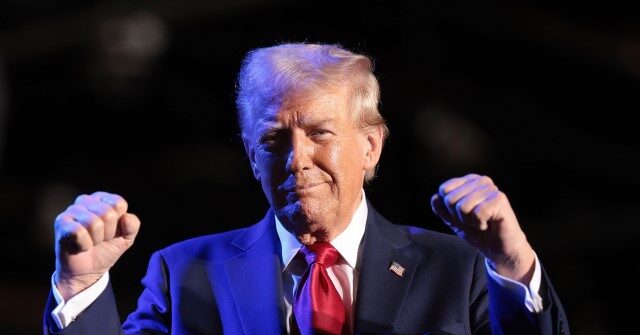Former President Donald Trump has firmly refuted Vice President Kamala Harris’s characterization of him as “exhausted” during his campaign trail, portraying her instead as a “low energy person.” In a discussion with Matthew Boyle from Breitbart News, hosted on SiriusXM Patriot Channel, Trump addressed Harris’s claims while highlighting his own active role in the current political landscape. Trump dismissed any notion of fatigue by recounting his numerous engagements across crucial battleground states, including speeches, interviews, and rallies. He expressed disbelief at Harris’s accusations, preferring to label her narrative as a fabrication stemming from the left.
Trump’s response to Harris was filled with confidence as he detailed his busy schedule, which included multiple stops and engagements in a single day. He remarked on his packed itinerary, emphasizing his commitment to attend a major rally in Pennsylvania and a football game featuring the Pittsburgh Steelers against the New York Jets. He asserted that his campaign efforts had gone uninterrupted for over 50 days and criticized Harris for missing the significant Al Smith Dinner, suggesting that her absence was a slight to the Catholic community. By juxtaposing his own activities against Harris’s perceived shortcomings, Trump sought to underscore his vitality and dedication to his campaign.
The former president’s routines involve tightly packed schedules that often extend well into the night, as illustrated by his activities on a recent Friday, which included appearances on Fox & Friends and a rally. Trump emphasized that he works tirelessly, asserting that the narrative of exhaustion attributed to him is not only untrue but is also an example of disinformation prevalent in political discourse. His constant engagement with supporters across various platforms, he argues, serves as evidence of his energy and commitment to the electorate.
Furthermore, Trump highlighted his upcoming plans, including working at a McDonald’s in Pennsylvania, a jab at Harris’s previous claims about her work history. This playful challenge illustrates his tendency to counter his opponents not just through political rhetoric but also through personal anecdotes. In doing so, Trump attempts to divert attention from criticisms aimed at him and redefine the narrative in a manner that favors his persona among supporters.
In Trump’s conversation, he navigated through the backlash against him implied in remarks from the left about potentially “weaponizing” the government should he return to power. He cleverly pointed out the contradictions in the criticisms directed at him, suggesting that claims of being exhausted juxtaposed with accusations of being an authoritarian are inconsistent. His assertion that he cannot possibly be exhausted while simultaneously being accused of having nefarious intent reflects his broader strategy of portraying himself as both hardworking and capable of confronting challenges.
Overall, Trump’s dismissal of Harris’s assertions reveals a larger narrative where he seeks to maintain an image of relentless energy and activity, contrasting the perception of fatigue that his opponents aim to promote. By highlighting his campaign’s vigorous pace and emphasizing key events that he participates in, Trump aims to reinforce his standing with supporters who value energy and commitment in political leadership. Ultimately, his approach seeks not only to counter Harris’s claims but also to resonate with the electorate by demonstrating unwavering dedication to his cause and his fitness as a potential leader.

